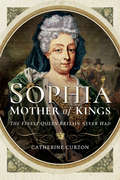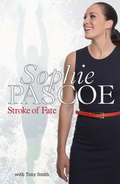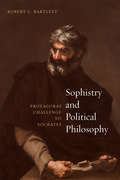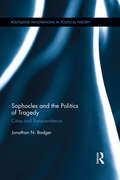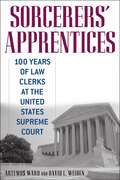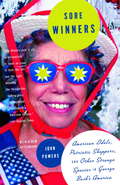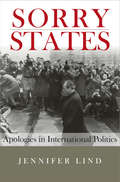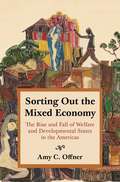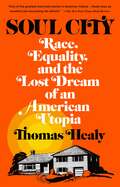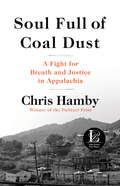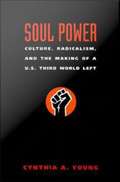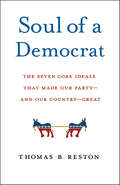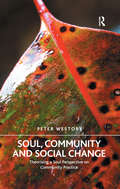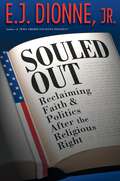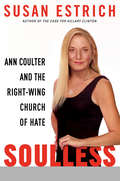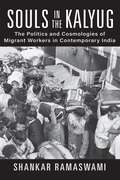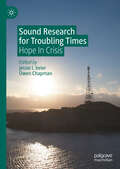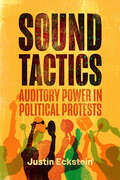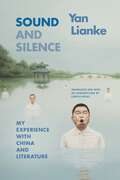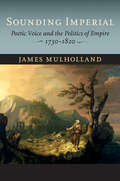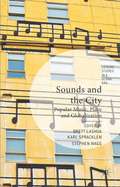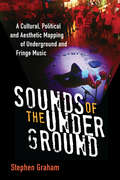- Table View
- List View
Sophia: The Finest Queen Britain Never Had
by Catherine CurzonFrom the Thirty Years&’ War to the formation of Great Britain, the royal mother of the House of Hanover comes to life in this historical biography. Princess Sophia of Hanover was born to greatness and yet fated to obscurity. The 1701 Act of Settlement made her the heiress presumptive to the thrones of England and Ireland, and yet she died mere weeks before becoming queen. Granddaughter of James I and mother to George I, she was perhaps the finest queen that Britain never had. As the daughter of Frederick V, the deposed King of Bohemia, Sophia spent an impoverished childhood in exile. Emerging as a woman of sparkling intelligence and cutting wit, she married Ernest Augustus and became the first Electress of Hanover. Sophia: Mother of Kings, brings this remarkable woman and her tumultuous era vividly to life. In a world where battles raged across the continent and courtiers fought behind closed doors, Sophia kept the home fires burning. Through personal tragedy and public triumph, Sophia raised a royal family and survived illness, miscarriage, and accusations of conspiracy. As the mother of Great Britain&’s first Georgian king, Sophia of Hanover began one of the most glittering dynasties the world has ever known. From the House of Stuart to the House of Hanover, this is the story of her remarkable life.
Sophia: The Finest Queen Britain Never Had
by Catherine CurzonFrom the Thirty Years&’ War to the formation of Great Britain, the royal mother of the House of Hanover comes to life in this historical biography. Princess Sophia of Hanover was born to greatness and yet fated to obscurity. The 1701 Act of Settlement made her the heiress presumptive to the thrones of England and Ireland, and yet she died mere weeks before becoming queen. Granddaughter of James I and mother to George I, she was perhaps the finest queen that Britain never had. As the daughter of Frederick V, the deposed King of Bohemia, Sophia spent an impoverished childhood in exile. Emerging as a woman of sparkling intelligence and cutting wit, she married Ernest Augustus and became the first Electress of Hanover. Sophia: Mother of Kings, brings this remarkable woman and her tumultuous era vividly to life. In a world where battles raged across the continent and courtiers fought behind closed doors, Sophia kept the home fires burning. Through personal tragedy and public triumph, Sophia raised a royal family and survived illness, miscarriage, and accusations of conspiracy. As the mother of Great Britain&’s first Georgian king, Sophia of Hanover began one of the most glittering dynasties the world has ever known. From the House of Stuart to the House of Hanover, this is the story of her remarkable life.
Sophie Pascoe - Stroke of Fate
by Tony SmithLosing a leg in a lawnmower accident would be catastrophic for most people. But swimming star Sophie Pascoe believes it?s the best thing that has happened to her. She reveals how her family helped her turn a negative into a positive and how she developed the drive to become one of the world?s greatest Paralympians. And, of course, she talks about bursting on to the international sporting stage with three gold medals and a silver as a schoolgirl at the Beijing Paralympic Games in 2008, her brush with losing her other leg and the mental strength she had to summon to go on to break a swag of world records and reap three further gold medals at the 2012 London Paralympics.
Sophistry and Political Philosophy: Protagoras' Challenge to Socrates
by Robert C. BartlettOne of the central challenges to contemporary political philosophy is the apparent impossibility of arriving at any commonly agreed upon “truths.” As Nietzsche observed in his Will to Power, the currents of relativism that have come to characterize modern thought can be said to have been born with ancient sophistry. If we seek to understand the strengths and weaknesses of contemporary radical relativism, we must therefore look first to the sophists of antiquity—the most famous and challenging of whom is Protagoras. With Sophistry and Political Philosophy, Robert C. Bartlett provides the first close reading of Plato’s two-part presentation of Protagoras. In the “Protagoras,” Plato sets out the sophist’s moral and political teachings, while the “Theaetetus,” offers a distillation of his theoretical and epistemological arguments. Taken together, the two dialogues demonstrate that Protagoras is attracted to one aspect of conventional morality—the nobility of courage, which in turn is connected to piety. This insight leads Bartlett to a consideration of the similarities and differences in the relationship of political philosophy and sophistry to pious faith. Bartlett’s superb exegesis offers a significant tool for understanding the history of philosophy, but, in tracing Socrates’s response to Protagoras’ teachings, Bartlett also builds toward a richer understanding of both ancient sophistry and what Socrates meant by “political philosophy.”
Sophocles and the Politics of Tragedy: Cities and Transcendence (Routledge Innovations in Political Theory)
by Jonathan N. BadgerSophocles and the Politics of Tragedy is an inquiry into a fundamental political problem made visible through the tragic poetry of Sophocles. In part I Badger offers a detailed exegesis of three plays: Ajax, Antigone, and Philoctetes. These plays share a common theme, illuminating a persistent feature of political life, namely the antagonism between the heroic commitment to the beautiful and the transcendent on the one hand, and the community’s need for bodily safety and material security on the other. This conceptual structure not only helps us understand these plays but also establishes a distinctive vision of the tragic dimension of political life—a vision that can be applied fruitfully to examinations of political projects quite distant from the world of fifth-century Athens. Such an application is the aim of part II, in which Badger coordinates the results of the inquiries of part I and applies them to a consideration of the competing claims of three strands of medieval and early modern political philosophy: ecclesiastical rule, scientific domination, and liberal government. Badger identifies the last of these—early modern liberalism—as a "tragic politics" that seeks to sustain and contain the tension between transcendent longing and material need.
Sorcerers' Apprentices: 100 Years of Law Clerks at the United States Supreme Court
by Artemus Ward David L WeidenA behind-the-scenes look at the role of law clerks and their history at the U.S. Supreme Court. Based on Supreme Court archives, the personal papers of justices and other figures at the Supreme Court, and interviews and written surveys with 150 former clerks, Sorcerers&’ Apprentices is a be-hind-the-scenes look at the life of a law clerk, and how it has evolved since its nineteenth-century beginnings. Artemus Ward and David L. Weiden reveal that throughout history, clerks have not only written briefs, but also made significant decisions about cases that are often unseen by those outside of justices&’ chambers. Should clerks have this power, they ask, and, equally important, what does this tell us about the relationship between the Supreme Court&’s accountability to and re-lationship with the American public?Sorcerers&’ Apprentices not only sheds light on the little-known role of the clerk but also offers provocative suggestions for reforming the institution of the Supreme Court clerk. Anyone that has worked as a law clerk, is considering clerking, or is interested in learning about what happens in the chambers of Supreme Court justices will want to read this engaging and comprehensive exami-nation of how the role of the law clerk has evolved over its long history.Praise for Sorcerers&’ Apprentices&“A rare book that is both a meticulous piece of scholarship and a good read.&” —Law and Politics Book Review &“Helps illuminate the inner workings of an institution that is still largely shrouded in mys-tery.&” —The Wall Street Journal Online &“Provides excellent insight into the inner workings of the Supreme Court, how it selects cases for review, what pressures are brought to bear on the justices, and how the final opinions are produced.&” —Library Journal
Sore Winners: American Idols, Patriotic Shoppers, and Other Strange Species in George Bush's America
by John PowersThe dollars are green. The terror level is orange. And everybody's seeing red. Welcome to Bush World.
Sorgen und wirtschaften: Zur Ökologie sozialer und ökonomischer Daseinsgestaltung
by Wolf Rainer WendtEin Buch zur Notwendigkeit, dass in der globalen Krise sorgend gewirtschaftet werden muss. In dieser Situation bedingen die Sorgen und das Wirtschaften einander. Der Zusammenhang, der beschrieben wird, ist ein vielseitiger und vielschichtiger. Er betrifft die soziale Versorgung, das staatliche Handeln und die Verantwortung von Unternehmen. Alle Akteure sind sorgend und wirtschaftend im ökologischen Rahmen beteiligt an einer Entwicklung, die vor Ort und global dem Leben zuträglich sein soll.
Sorry States: Apologies in International Politics (Cornell Studies in Security Affairs)
by Jennifer LindGovernments increasingly offer or demand apologies for past human rights abuses, and it is widely believed that such expressions of contrition are necessary to promote reconciliation between former adversaries. The post-World War II experiences of Japan and Germany suggest that international apologies have powerful healing effects when they are offered, and poisonous effects when withheld. West Germany made extensive efforts to atone for wartime crimes-formal apologies, monuments to victims of the Nazis, and candid history textbooks; Bonn successfully reconciled with its wartime enemies. By contrast, Tokyo has made few and unsatisfying apologies and approves school textbooks that whitewash wartime atrocities. Japanese leaders worship at the Yasukuni Shrine, which honors war criminals among Japan's war dead. Relations between Japan and its neighbors remain tense.Examining the cases of South Korean relations with Japan and of French relations with Germany, Jennifer Lind demonstrates that denials of past atrocities fuel distrust and inhibit international reconciliation. In Sorry States, she argues that a country's acknowledgment of past misdeeds is essential for promoting trust and reconciliation after war. However, Lind challenges the conventional wisdom by showing that many countries have been able to reconcile without much in the way of apologies or reparations. Contrition can be highly controversial and is likely to cause a domestic backlash that alarms—rather than assuages—outside observers. Apologies and other such polarizing gestures are thus unlikely to soothe relations after conflict, Lind finds, and remembrance that is less accusatory-conducted bilaterally or in multilateral settings-holds the most promise for international reconciliation.
Sorting Out the Mixed Economy: The Rise and Fall of Welfare and Developmental States in the Americas (Histories of Economic Life #16)
by Professor Amy C. OffnerThe untold story of how U.S. development efforts in postwar Latin America helped lead to the dismantling of the U.S. welfare stateIn the years after 1945, a flood of U.S. advisors swept into Latin America with dreams of building a new economic order and lifting the Third World out of poverty. These businessmen, economists, community workers, and architects went south with the gospel of the New Deal on their lips, but Latin American realities soon revealed unexpected possibilities within the New Deal itself. In Colombia, Latin Americans and U.S. advisors ended up decentralizing the state, privatizing public functions, and launching austere social welfare programs. By the 1960s, they had remade the country’s housing projects, river valleys, and universities. They had also generated new lessons for the United States itself. When the Johnson administration launched the War on Poverty, U.S. social movements, business associations, and government agencies all promised to repatriate the lessons of development, and they did so by multiplying the uses of austerity and for-profit contracting within their own welfare state. A decade later, ascendant right-wing movements seeking to dismantle the midcentury state did not need to reach for entirely new ideas: they redeployed policies already at hand.In this groundbreaking book, Amy Offner brings readers to Colombia and back, showing the entanglement of American societies and the contradictory promises of midcentury statebuilding. The untold story of how the road from the New Deal to the Great Society ran through Latin America, Sorting Out the Mixed Economy also offers a surprising new account of the origins of neoliberalism.
Soul City: Race, Equality, and the Lost Dream of an American Utopia
by Thomas HealyA New York Times Book Review Editors’ ChoiceThe fascinating, forgotten story of the 1970s attempt to build a city dedicated to racial equality in the heart of “Klan Country”In 1969, with America’s cities in turmoil and racial tensions high, civil rights leader Floyd McKissick announced an audacious plan: he would build a new city in rural North Carolina, open to all but intended primarily to benefit Black people. Named Soul City, the community secured funding from the Nixon administration, planning help from Harvard and the University of North Carolina, and endorsements from the New York Times and the Today show. Before long, the brand-new settlement – built on a former slave plantation – had roads, houses, a health care center, and an industrial plant. By the year 2000, projections said, Soul City would have fifty thousand residents.But the utopian vision was not to be. The race-baiting Jesse Helms, newly elected as senator from North Carolina, swore to stop government spending on the project. Meanwhile, the liberal Raleigh News & Observer mistakenly claimed fraud and corruption in the construction effort. Battered from the left and the right, Soul City was shut down after just a decade. Today, it is a ghost town – and its industrial plant, erected to promote Black economic freedom, has been converted into a prison.In a gripping, poignant narrative, acclaimed author Thomas Healy resurrects this forgotten saga of race, capitalism, and the struggle for equality. Was it an impossible dream from the beginning? Or a brilliant idea thwarted by prejudice and ignorance? And how might America be different today if Soul City had been allowed to succeed?
Soul Full of Coal Dust: A Fight for Breath and Justice in Appalachia
by Chris HambyIn a devastating and urgent work of investigative journalism, Pulitzer Prize winner Chris Hamby uncovers the tragic resurgence of black lung disease in Appalachia, its Big Coal cover-up, and the resilient mining communities who refuse to back down. Decades ago, a grassroots uprising forced Congress to enact long-overdue legislation designed to virtually eradicate black lung disease and provide fair compensation to coal miners stricken with the illness. Today, however, both promises remain unfulfilled. Levels of disease have surged, the old scourge has taken an aggressive new form, and ailing miners and widows have been left behind by a dizzying legal system, denied even modest payments and medical care. In this devastating and urgent work of investigative journalism, Pulitzer Prize winner Chris Hamby traces the unforgettable story of how these trends converge in the lives of two men: Gary Fox, a black lung-stricken West Virginia coal miner determined to raise his family from poverty, and John Cline, an idealistic carpenter and rural medical clinic worker who becomes a lawyer in his fifties. Opposing them are the lawyers at the coal industry&’s go-to law firm; well-credentialed doctors who often weigh in for the defense, including a group of radiologists at Johns Hopkins; and Gary&’s former employer, Massey Energy, the region&’s largest coal company, run by a cantankerous CEO often portrayed in the media as a dark lord of the coalfields. On the line in Gary and John&’s longshot legal battle are fundamental principles of fairness and justice, with consequences for miners and their loved ones throughout the nation. Taking readers inside courtrooms, hospitals, homes tucked in Appalachian hollows, and dusty mine tunnels, Hamby exposes how coal companies have not only continually flouted a law meant to protect miners from deadly amounts of dust but also enlisted well-credentialed doctors and lawyers to help systematically deny much-needed benefits to miners. The result is a legal and medical thriller that brilliantly illuminates how a band of laborers — aided by a small group of lawyers, doctors and lay advocates, often working out of their homes or in rural clinics and tiny offices – challenged one of the world's most powerful forces, Big Coal, and won. A deeply troubling yet ultimately triumphant work, Soul Full of Coal Dust is a necessary and timely book about injustice and resistance.
Soul Power: Culture, Radicalism, and the Making of a U.S. Third World Left
by Cynthia A. YoungSoul Power is a cultural history of those whom Cynthia A. Young calls "U. S. Third World Leftists," activists of color who appropriated theories and strategies from Third World anticolonial struggles in their fight for social and economic justice in the United States during the "long 1960s. " Nearly thirty countries in Africa, Asia, and Latin America declared formal independence in the 1960s alone. Arguing that the significance of this wave of decolonization to U. S. activists has been vastly underestimated, Young describes how literature, films, ideologies, and political movements that originated in the Third World were absorbed by U. S. activists of color. She shows how these transnational influences were then used to forge alliances, create new vocabularies and aesthetic forms, and describe race, class, and gender oppression in the United States in compelling terms. Young analyzes a range of U. S. figures and organizations, examining how each deployed Third World discourse toward various cultural and political ends. She considers a trip that LeRoi Jones, Harold Cruse, and Robert F. Williams made to Cuba in 1960; traces key intellectual influences on Angela Y. Davis's writing; and reveals the early history of the hospital workers' 1199 union as a model of U. S. Third World activism. She investigates Newsreel, a late 1960s activist documentary film movement, and its successor, Third World Newsreel, which produced a seminal 1972 film on the Attica prison rebellion. She also considers the L. A. Rebellion, a group of African and African American artists who made films about conditions in the Watts neighborhood of Los Angeles. By demonstrating the breadth, vitality, and legacy of the work of U. S. Third World Leftists, Soul Power firmly establishes their crucial place in the history of twentieth-century American struggles for social change.
Soul of a Democrat: The Seven Core Ideals That Made Our Party—and Our Country—Great
by Thomas B. RestonIn 2016 the Democratic Party lost control of every branch of government. Countless explanations and excuses have been offered, but in this heartfelt, evocative book longtime Democratic activist Thomas B. Reston illuminates the true cause: the Party has lost its soul. In Reston’s view the Party has abandoned any unifying idealistic message. Instead of crafting policies and platforms that appeal to the nation as a whole, Democrats target specific blocs of voters –and change their talking points accordingly.This divisive approach will not end well for Democrats, or the country as a whole. If they want to remain competitive on the national stage, Reston argues, Democrats need a coherent, blunt set of American ideals. The good news is, they already have one.In Soul of a Democrat, Reston takes us on a journey through the history of the Party with thumbnail portraits of its most important figures, illuminating the core ideals and principles they fought for. Thomas Jefferson founded the Democratic Party to lift up the people as a whole by empowering each individual citizen. Andrew Jackson committed the party to always fight for outsiders. Woodrow Wilson insisted on a progressive respect for ideas. William Jennings Bryan introduced the altruistic Social Gospel. Franklin D. Roosevelt promised economic security for all. Lyndon B. Johnson championed the ongoing struggle for civil rights.These Democratic statesmen knew that a successful party needs strong idealistic roots, an understandable message, and an emphatic focus on the purpose of what it is doing, instead of on the mechanics. Reston’s concise and elegant book shows modern Democrats how to learn from their own past, and once again become The Party of The People.
Soul on Ice
by Eldridge CleaverThe now-classic memoir that shocked, outraged, and ultimately changed the way America looked at the civil rights movement and the black experience. By turns shocking and lyrical, unblinking and raw, the searingly honest memoirs of Eldridge Cleaver are a testament to his unique place in American history. Cleaver writes in Soul on Ice, "I'm perfectly aware that I'm in prison, that I'm a Negro, that I've been a rapist, and that I have a Higher Uneducation." What Cleaver shows us, on the pages of this now classic autobiography, is how much he was a man.
Soul, Community and Social Change: Theorising a Soul Perspective on Community Practice
by Peter WestobyAt a time when inequalities are growing globally, when the pace of socio-economic transitions is rapid, and when traditional ties of community are under threat of dissolving, 'soul' offers a new way of thinking imaginatively about how people might respond both individually and collectively in social change work. In exploring ideas such as soul, soulful, 'soul of the world' and soul-force, Peter Westoby invites readers to disrupt their taken-for-granted assumptions about community practice and to foreground ethics, quality, being and the aesthetic. Drawing on work of people such as James Hillman, Thomas Moore and 'Bifo' Beradi, he insists on the need to bring more depth into practice, eschewing contemporary trends of soulless analysis, measuring, and technique. Written in dialogue with eight practitioner-scholars from around the world, the book suggests a fresh terrain for community work and social change theorising. Illustrated by images of Australian cartoonist-prophet Michael Leunig, the book also promises to unlock new imaginative spaces for dreaming. A soul perspective will resonate with people searching for both a robust socio-political response to the world and an imaginative, poetic and mindful centring of self, 'other' and the planet to their practice.
Souled Out: Reclaiming Faith and Politics after the Religious Right
by E. J. DionneThe religious and political winds are changing. Tens of millions of religious Americans are reclaiming faith from those who would abuse it for narrow, partisan, and ideological purposes. And more and more secular Americans are discovering common ground with believers on the great issues of social justice, peace, and the environment. In Souled Out, award-winning journalist and commentator E. J. Dionne explains why the era of the Religious Right--and the crude exploitation of faith for political advantage--is over. Based on years of research and writing, Souled Out shows that the end of the Religious Right doesn't signal the decline of evangelical Christianity but rather its disentanglement from a political machine that sold it out to a narrow electoral agenda of such causes as opposition to gay marriage and abortion. With insightful portraits of leading contemporary religious figures from Rick Warren and Richard Cizik to John Paul II and Benedict XVI, Dionne shows that our great religions have always preached a broad message of hope for more just human arrangements and refused to be mere props for the powers that be. Dionne also argues that the new atheist writers should be seen as a gift to believers, a demand that they live up to their proclaimed values and embrace scientific and philosophical inquiry in a spirit of "intellectual solidarity." Written in the tradition of Reinhold and H. Richard Niebuhr, Souled Out will help change how we think and talk about religion and politics in the post-Bush era.
Soulless: Ann Coulter and the Right-Wing Church of Hate
by Susan Estrich"A word to those of you out there who have yet to be offended by something I have written or said: Please be patient. I am working as fast as I can." –Ann Coulter, 2006Is she ever!Ever since the publication of her Clinton-bashing debut, High Crimes and Misdemeanors, right-wing fire-brand Ann Coulter has made herself one of the most talked-about figures in contemporary American life—and has done so by issuing a near-continuous barrage of insult and invective, which has been described as "shameless," "cruel," "shrill, bombastic, and mean-spirited," "grossly inappropriate," "hate speech." She has called the 9/11 widows "witches" and "harpies," referred to Muslims as "ragheads," called Al Gore a "total fag," and said that both New York Times editor Bill Keller and antiwar congressman Jack Murtha deserved to die. Yet with each new statement—and each new book launch—Coulter somehow manages to co-opt the media as a megaphone for her attacks, while emerging from the backlash miraculously unscathed.Until now. With Soulless, political commentator Susan Estrich takes on Ann and the "Coulter culture" she has created, exposing how the pundit provocatrice has downgraded our political discourse with her irresponsible rhetoric, personal attacks, and slanderous asides. Trawling through Coulter's history of often-violent public statements, Estrich asks which are more cynical: the pundit and her headline-grabbing drive-by character assassinations, or the networks who happily bring her back for more. Soulless also casts a light on "the Anns," wannabes like Michelle Malkin and Glenn Beck, whose imitation Coulterisms coarsen our culture with every passing news cycle. And, most important, she challenges us—the readers, the voters—to remember that behind the huckster's rhetoric lurks a dangerous reactionary whose real agenda is wildly out of step with the American public.As Estrich says, "She knows exactly what she is doing. And she is scary as hell because of it."
Souls in the Kalyug: The Politics and Cosmologies of Migrant Workers in Contemporary India
by Shankar RamaswamiHow migrant workers in contemporary India strive toward, and at times realize, elements of a good lifeThe economic development process in India is one that has induced new difficulties and hardships into the lives of poor and working people despite its alleged achievements. In villages, farming families confront an agrarian crisis, with rising costs of seeds, fertilizers, and pesticides; low prices for crops in the face of grave indebtedness; and ecological damage to the soil, water, and forests. Due to the scarcity of jobs, many migrate to cities for work. Once in the city, migrants take on and must contend with low-paid, insecure, and hazardous work. And in urban neighborhoods, they deal with congested living conditions; poor qualities of air, water, and sanitation; and separation from their families in the village.Souls in the Kalyug introduces readers to migrant workers who are confronting myriad hardships and asks how it is that these workers create lives that can become less injurious than their circumstances might suggest. Anthropologist Shankar Ramaswami proposes a three-part answer. In a metal factory in Delhi, migrant workers engage in resistance and collective struggle against perceived oppression and injustice. In the city and village, they weave connections to one another, building friendships in empathetic closeness and fellowship. In the metaphysical realm, they attempt to resist soul-distorting processes in our present, decivilizing times, or the Kalyug. Through these activities, migrant workers strive toward, and at times realize, elements of a good life.Souls in the Kalyug ultimately presents a nuanced and intimate portrait of migrant workers through a complex study of entanglement and noncooperation in workers’ worlds, and in its analysis of workers’ politics, within and outside of labor unions, interpersonal relationships, and foundational religious and cosmological worldviews.
Sound Research for Troubling Times: Hope In Crisis
by Jessie L. Beier Owen ChapmanThis edited collection takes the prompt “hope in crisis” as a starting point for investigating sound research as it is situated in these troubling times. The book brings together thinkers from numerous scholarly domains (i.e. communication studies, art education, creative art therapy, psychology and philosophy) to explore the question of hope as it relates to sonic research-creation practices in/and times of crisis. Some of the prompts and provocations explored by the authors within the collection include, but are not limited to: explorations of sonic research-creation practices as they are situated within contemporary convergence of crises; theoretical investigations of the concept of hope as it relates to sonic temporalities, ontologies, and epistemologies; articulations of experimental sonic pedagogies; examinations of hope as it plays out in institutional settings and/or sound and music scenes (i.e. music education, artistic communities, activist communities); investigations of experimental listening practices as they relate to contemporary crises; explorations of post-human, non-human, and inhuman sonic resonances in research-creation practices; and experimental practices that deploy sound and sonic approaches for emergent, collective research both within, but also outside of, academic institutions. Positioned as a material that holds the potential to frustrate common approaches to research, whether through its refusal of occularcentric perspectives, its leaky data protocols or its distortion of future horizons, sound is explored here as that which might counter the default refrains that have pushed hope itself into crisis. Importantly, while sound research is explored in this book in relation to hope, it is not offered up as a better way forward, nor is it presented as a solution. Sound research is instead posed as a question, with each author responding in their own way through experiments with the potentials, but also limits, of and for sonic practices. Central to the project, then, is the question of how to collectively and creatively respond to the increasingly difficult— even untenable—circumstances that have come to limit future possibilities, both within fields of research but also beyond, without falling back on the unquestioned assumption that hope alone will actualize a desired otherworld. The sound research gathered here experiments with such possibilities in order to grapple with how present conditions, including conditions for research, are always contingent—always already in trouble—and thus also subject to change both conceptually and materially.
Sound Tactics: Auditory Power in Political Protests (RSA Series in Transdisciplinary Rhetoric)
by Justin EcksteinFrom call and response chants to the noise of pots and pans, protests are often defined by their sounds. In this book, Justin Eckstein argues that this is not merely the result of catchy slogans; it is due to sound’s ability to hold those in power accountable. Sound Tactics highlights how, in a world grappling with the uncertainty of emergent digital practices, social movements utilize the rhetorical power of sound.Eckstein uses the waveform as a metaphor for the persuasive potential of sound. Examining the case studies of the March for Our Lives protest, Howard University’s HUResist movement, and the Casseroles protest in Montreal, Eckstein demonstrates how changes to the immediacy, intensity, and immersiveness of sound can affect the power of an argument. The collective use of sound in these case studies conveys the unity of the protestors in their demand for change and underlines the strength of their argument to those in power.More than just the written word spoken aloud, sound has unique layers of added meaning—it can convey length of time, demand attention, and signal disapproval. Eckstein’s study unpacks those layers for scholars and students, as well as activists interested in deploying sound for change.
Sound and Silence: My Experience with China and Literature (Sinotheory)
by Lianke YanYan Lianke is a world-renowned author of novels, short stories, and essays whose provocative and nuanced writing explores the reality of everyday life in contemporary China. In Sound and Silence, Yan compares his literary project to a blind man carrying a flashlight whose role is to help others perceive the darkness that surrounds them. Often described as China’s most censored author, Yan reflects candidly on literary censorship in contemporary China. He outlines the Chinese state’s project of national amnesia that suppresses memories of past crises and social traumas. Although being banned in China is often a selling point in foreign markets, Yan argues that there is no requisite correlation between censorship and literary quality. Among other topics, Yan also examines the impact of American literature on Chinese literature in the 1980s and 1990s. Encapsulating his perspectives on life, writing, and literary history, Sound and Silence includes an introduction by translator Carlos Rojas and an afterword by Yan.
Sounding Imperial: Poetic Voice and the Politics of Empire, 1730–1820
by James MulhollandSpoken words come alive in written verse.In Sounding Imperial, James Mulholland offers a new assessment of the origins, evolution, and importance of poetic voice in the eighteenth and early nineteenth centuries. By examining a series of literary experiments in which authors imitated oral voices and impersonated foreign speakers, Mulholland uncovers an innovative global aesthetics of poetic voice that arose as authors invented new ways of crafting textual voices and appealing to readers. As poets drew on cultural forms from around Great Britain and across the globe, impersonating "primitive" speakers and reviving ancient oral performances (or fictionalizing them in verse), they invigorated English poetry.Mulholland situates these experiments with oral voices and foreign speakers within the wider context of British nationalism at home and colonial expansion overseas. Sounding Imperial traces this global aesthetic by reading texts from canonical authors like Thomas Gray, James Macpherson, and Felicia Hemans together with lesser-known writers, like Welsh antiquarians, Anglo-Indian poets of colonialism, and impersonators of Pacific islanders. The frenetic borrowing, movement, and adaptation of verse of this time offers a powerful analytic by which scholars can understand anew poetry’s role in the formation of national culture and the exercise of colonial power. Sounding Imperial offers a more nuanced sense of poetry’s unseen role in larger historical processes, emphasizing not just appropriation or collusion but the murky middle range in which most British authors operated during their colonial encounters and the voices that they used to make those cross-cultural encounters seem vivid and alive.
Sounds and the City
by Stephen Wagg Karl Spracklen Brett LashuaThis book explores the ways in which Western-derived music connects with globalization, hybridity, consumerism and the flow of cultures. Both as local terrain and as global crossroads, cities remain fascinating spaces of cultural contestation and meaning-making via the composing, playing, recording and consumption of popular music.
Sounds of the Underground: A Cultural, Political and Aesthetic Mapping of Underground and Fringe Music
by Stephen GrahamIn Sounds of the Underground, Stephen Graham examines the largely unexplored terrain of underground music-exploratory forms of music-making, such as noise, free improvisation, and extreme metal, that exist outside or on the fringes of mainstream culture, generally independent from both the market and from traditional high-art institutions. Until now there has been little scholarly discussion of underground music and its cultural, political, and aesthetic importance. In addition to providing a much-needed historical outline of this diverse scene, Stephen Graham focuses on the digital age, showing the underground and its fringes as based largely in radical anti-capitalist politics and aesthetics, tied to the political contexts and structures of late-capitalism. Sounds of the Underground explores these various ideas of separation and capture through interviews and analysis, developing a critical account of both the music and its political and cultural economy. Book jacket.
